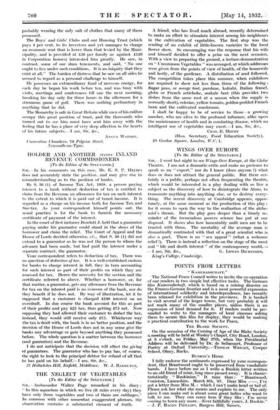• HOLDER AND ANOTHER versus INLAND REVENUE COMMISSIONERS I To
the Editor of the SPEcr.vron.] - Si his comments on this ease, Mr. E. S. P. Haynes does not accurately state the position, and may give rise to misunderstanding as to the position of banks.
By S. 30 (1) of Income Tax Act, 1918, a person paying interest to a bank without deduction of tax is entitled to claim from the Revenue an allowance for tax on such interest to the extent to which it is paid out of taxed income. It is regarded as 'a charge on his income both for Income Tax and Sur-fax. As your correspondent. himself points out, the usual practice is for the bank. to furnish the necessary certificate of payment of the interest.
In the court of first instance Rowlatt J. held that a guarantor paying under Isis guarantee could stand in the shoes of the borrower and claim the relief. The Court of Appeal and the
House of Lords decided otherwise, that S. 30 (1) did not extend to a guarantor as he was not the person to whom the advance had been made, but had paid the interest under • a
separate contract, the guarantee. - • •
Your correspondent refers to deduction of tax. There was Iii) question of deduction of tax. It is a well-established custom for banks to charge interest in full; they in turn accounting for such interest as part of their profits on which they are assessed for tax. Hence the necessity for the section and the certificate referred to above. • Whether a. borrower, or, for that matter, a guarantor, gets any allowance from the Revenue for tax on the interest Paid is no Concern of the bank, nor do they benefit if he does not. • By way of illustration, let it be supposed that a customer is charged 1100 interest on an overdraft. In due course the bank account for this as part of their profits and pay. 125 tax, thus getting 175 net. Now supposing they had allowed their customer to deduct the tax; instead,' they would --still- receive only 175. Whichever Way the tax is.deait with, the bank is in no better position; and the decision of the House of Lords does not, in any sense give the banks any advantage or gain beyond anything they possessed before. The Whole question is 's matter between the borrower
(and guarantor) and the Revenue: 7 - •.
I do not anticipate that the decision Will affect. the giving of guarantees. The guarantor who lass to payhas, of course, the right to look to the principal debtor for refund of allthat be MIA paid on his behalf.--! am, Sir, ite„
37 Holtwhites Hill, Enfield, Middlesex. W. J.




































 Previous page
Previous page